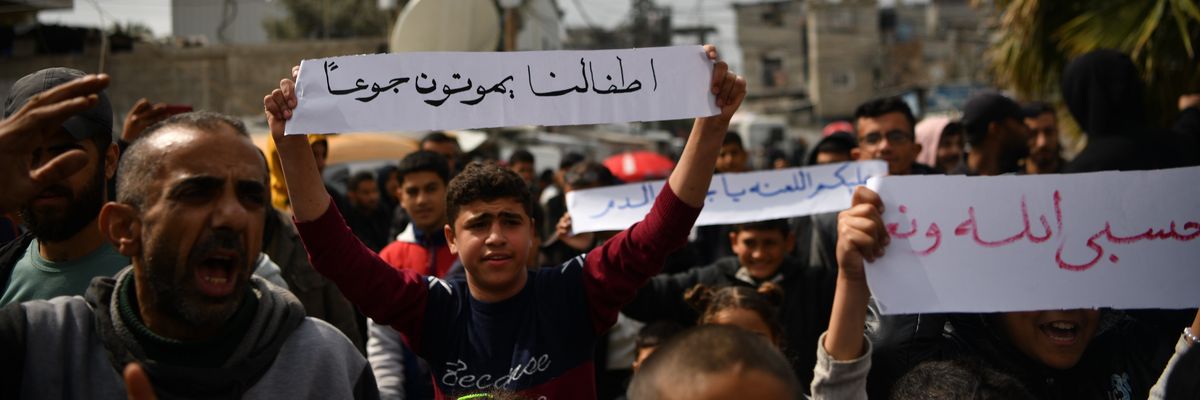U.S. President Joe Biden's claim Monday that a temporary cease-fire deal is "close" and could take effect as soon as next week reportedly took Israel's leadership by surprise and was quickly downplayed by Hamas officials, who said there were still major disputes between the two sides on key issues.
Biden's told
NBC's Seth Meyers that Israeli negotiators have agreed "that they would not engage in activities during Ramadan"—the Muslim holy month—"in order to give us time to get all the hostages out."
In earlier remarks to reporters, the U.S. president said his "national security adviser tells me that they're close" to an agreement.
"They're not done yet," said Biden,
ice cream cone in hand. "My hope is by next Monday we'll have a cease-fire."
The Associated Pressreported early Tuesday that Biden's comments "came as a surprise" to Israeli officials "and were not made in coordination with the country's leadership." Hamas, for its part, cast doubt on the prospect of an imminent deal, with one official tellingReuters that there were "still big gaps to be bridged."
"The primary and main issues of the cease-fire and the withdrawal of Israeli forces are not clearly stated, which delays reaching an agreement," said the unnamed official.
Any cease-fire deal is likely to be limited in duration; a pause late last year lasted just a week and was
followed by intense Israeli bombing. Regardless of a potential cease-fire agreement, Israeli Prime Minister Benjamin Netanyahu has pledged to go ahead with a ground invasion of the besieged Gaza city of Rafah despite global outcry and mounting internal skepticism over the Israeli war cabinet's stated military objectives.
As truce negotiations brokered by the U.S., Qatar, and Egypt continue, Israel's military shows no sign of easing its aerial attacks on the Gaza Strip, which has been
utterly devastated by nearly five months of relentless bombing. Gaza's Ministry of Health said early Tuesday that Israeli forces have killed at least 96 people and wounded 172 more over the past 24 hours, with many victims still buried under rubble.
According to a Monday
update from the United Nations' humanitarian affairs office, "intense Israeli bombardment from air, land, and sea continues to be reported across much of the Gaza Strip, resulting in further civilian casualties, displacement, and destruction of civilian infrastructure."
The Israeli military has killed more than 29,800 people in Gaza since its assault began following a deadly Hamas-led attack on October 7. Most of Gaza's population is currently displaced and at risk of starvation.
"It is impossible to ignore the obvious question: Given the thousands that have been killed, why wasn't this done sooner?"
Critics of the Biden administration's approach to the war—which has entailed unwavering military and diplomatic support for Israel paired with mild calls for the protection of Gaza civilians—said the president's push for a temporary cease-fire agreement is too little, too late.
A cease-fire deal "could have been reached a very long time ago if Biden actually wanted it,"
The Intercept's Jeremy Scahill wrote on social media. "But he made sure that would not happen and continued to funnel arms and political support to Israel's scorched-earth war against Gaza."
Justice Democrats, a progressive advocacy organization,
noted that U.S. Reps. Cori Bush (D-Mo.), Rashida Tlaib (D-Mich.), and others have been pushing for a cease-fire since October, only to face public attacks from the White House.
Since October, the U.S. has exercised its veto power three times at the U.N. Security Council to tank resolutions calling for a negotiated stop to the fighting. The
latest veto came just a week ago.
The U.S. is currently circulating a draft resolution at the U.N. Security Council that expresses "support for international diplomatic efforts to expeditiously and urgently conclude and begin implementing an agreement for a temporary ceasefire in Gaza together with the release of all hostages as soon as possible."
Trita Parsi, executive vice president of the Quincy Institute for Responsible Statecraft,
wrote Monday that the resolution marks some progress but "is still problematic" because it "only calls for a temporary cease-fire."
"A shift in the right direction is still very welcome," Parsi added, "but it is impossible to ignore the obvious question: Given the thousands that have been killed, why wasn't this done sooner?"
